Field Days in La Lucine
At the beginning of September 2019, the HORSCH France Field Days took place for the twelfth time. Every two years interested farmers meet at the company headquarters in La Lucine near Châteauvillain in the department Haute-Marne. This year, too, the event was a huge success.
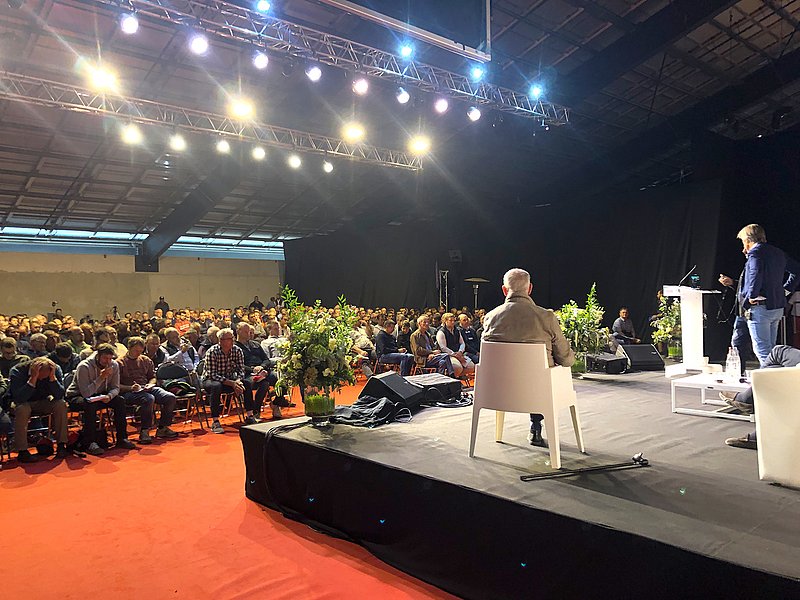
More than 1,000 participants – dealers and farmers – followed the invitation to the three-day-event with speeches, machine demonstrations and workshops. Philipp, Michael and Cornelia Horsch as well as Theo Leeb also were on site.
The 10th of September was reserved for dealers, the next two days for the farmers. The agenda was the same: speeches, exchange and discussions in the morning, machine demonstrations and presentation of the innovations of the HORSCH and HORSCH LEEB product range in the afternoon.
The Leeb PT, the first licensed HORSCH self-propelled sprayer in France, left a good impression. The guests were also very interested in the new HORSCH tools for hybrid farming: the hoe Transformer VF, the hoeing harrow Cura ST and the fine cultivator Finer SL.
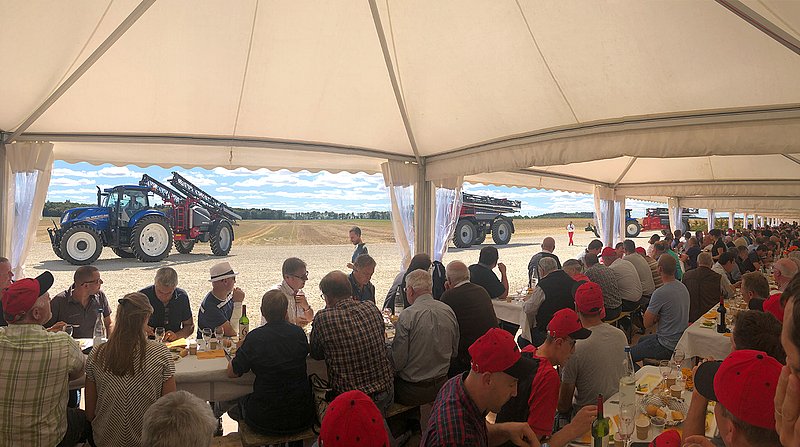
Each workshop highlighted one part of the HORSCH product range from a certain point of view:
- Workshop ”Hybrid Farming“ – with a detailed presentation of the new HORSCH weed control line
- Workshop ”Low Disturbance“ – with focus on the HORSCH direct seed drills
- Workshop ”Biogas“ – with a presentation of the latest Focus TD that has been perfectly adapted to the cultivation of catch crops for the production of energy
- Workshop ”Minimum Tillage“ – introducing the two different versions of the Terrano GX – one for deep and one for very shallow cultivation
- Workshop ”Plant Protection“ – with detailed technical information about the precision spraying technology of the Leeb AX, Leeb PT and Leeb LT.
All machines were presented again in a final show.
Pesticide residues in the focus of discussion
The consumers ask more and more questions about the influence of food on their health. After the worries about the quantities of sugar and fat in our food new topics come along step by step. The focus more and more is on pesticide residues in our food. In the speeches on the first public day, two speakers from different sectors talked about their point of view.
Julie Sabourin is responsible for the sectors quality and technology of the ”Collectif Nouveau Champs“, an association that was founded in 2018 by producers that actively campaign for agriculture and environment. Their cachet is called ”Zéro résidus de pesticides“ (= Zero pesticide residues). The initiative was founded by ”Les paysans de Rougeline“, a company that sells fruits and vegetables. In the meantime, their product range includes the first product line without pesticide residues.
The seven founding companies devised a strategy that can be applied to the whole sector of plant production. “Our association represents 20 per cent of the fruit and vegetable sector in France. And we are growing extremely fast! But we also want to expand our ideas to other sectors of plant production“, Julie Sabourin explains. In viticulture and for hard wheat the project already is in full swing.
The Collectif acts on the fact that society demands more and more transparency with regard to pesticide residues. “There is a demand: 89 per cent of the French demand more information and want to know if there are pesticides in our food or not”, Julie Sabourin points out. “Thanks to the cachet “Zero pesticide residues“ they can read it clearly and precisely.” The Collectif has committed itself to success to show the consumer that they make every effort to keep their promise. This success, of course, requires the active contribution of the members. „We encourage our producers to look for alternatives to chemical pesticides, e.g. products for which there is no maximum residue limit and no associated residue definition. They also have to expand their knowledge about the contamination risks“, Julie Sabourin explains. The cachet also is based on the HVE cachet (Haute Valeur Environnementale = Of high environmental benefit). A lot of the producers have already been certified respectively are right in the middle of the certification process.
Such measures would not be possible without the scientists who can trace these pesticide residues. They are supported by laboratories like for example the Labor Kneissler, that was founded in 1993 by Dr. Andreas Kneissler. He was the second speaker of the morning.
Dr. Kneissler’s laboratory has specialised in tracing active substances, mycotoxins and pesticides. Their customers are cachets like “Zero pesticide residues” who want to guarantee the sustainability of their measures. “We carry out 15,000 tests per month – in food, drinking water and feeding stuff”, Dr. Andreas Kneissler explains. “Our job requires an enormous expert knowledge. One example: tracing the glyphosate ratio below the maximum residue limit – 1 mg per kg – in olives, is as if you tried to find out where on his ship the captain of the Queen Mary 2 is at the moment. Today we even succeed in finding his captain’s hat.“
Dr. Andreas Kneissler presented the different analysis methods and then described the project “HORSCH wheat”. The objective is to answer the question under which circumstances conventionally cultivated wheat does not contain any pesticide residues. “We have examined the connection between the cultivation conditions and the pesticide residues in common wheat – based on the agricultural, geographical and meteorological conditions”, Dr. Andreas Kneissler specifies. The results will soon be published.
What can we do against agri-bashing?
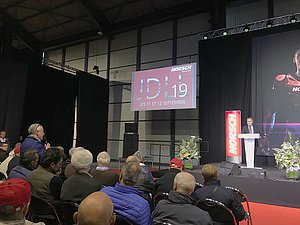
Eddy Fougier was the third speaker of the morning. The political scientist analysed several protest movements. He acts as an advisor on these topics and in 2018 he wrote a study about agri-bashing.
“Some misuse this word and refer to any criticism of the agricultural sector as agri-bashing. Others, however, claim that there is no such thing as agri-bashing“, he points out. And he also offers a good definition of the term: “Agri-bashing is a feeling shared by many farmers that means that their profession, some of their activities and the conventional production methods are regularly subject to hostility, criticism and defamation in public and especially in the large leading media.“
“The criticism of conventional agricultural production methods is not new. People already pointed a finger at the use of growth hormones in the 70s or at genetically modified organisms in the 90s“, Eddy Fougier clarifies. But some time ago, this criticism changed massively. It first extended to numerous topics (climate, animal well-being, plant protection agents…) and then became radical: visible campaigns with reports shown at prime time; invisible campaigns like trespassing into the stables of livestock farmers or even aggressive behaviour towards farmers.
At first, the reaction of the professional associations was not appropriate. “It was too technical, too far away from the worries of the population”, Eddy Fougier regrets. We also have to shake off the antiquated image of the farmer as a victim: “75 per cent of the French have a high opinion of the farmers. It’s their methods that are questioned.“ Eddy Fougier’s advice for the farmers is to seize the opportunity to take the communication into their own hands and get back into contact with the consumer.
In fact, you must not equate the organisations that express this criticism with the consumers. The opinions of these two groups often differ widely. You have to address the consumers. The “societal expectations“ regarding agricultural production that are often discussed (organic, production relocation etc….) so far have only been expressed by a small part of society. Though it only is a small part, it is a loud one. According to the political scientist “it therefore is essential that you do not underestimate the weight of those who criticise you.”
“Society is polarised. 60 per cent of the French say that they do not mind whether they pay 10 Euro more or less when they do their shopping. But the price still remains the main concern. The average citizen is considerably less prejudiced against you than you might think!” Eddy Fougier is convinced.
So what can we do? According to Eddy Fougier it is important to rectify the untruths about agricultural methods that are told everywhere in public. On the other hand, it is indispensable to use the negative aspects of agri-bashing and react to them with a positive communication. “A good example happened in October 2018. After they had faced death threats from their neighbours, the attacked farmers decided not to retreat, but to organise an open house event to show their neighbours how they work. It was a huge success. Everyone was satisfied.“
Last but not least: “We have to take advantage of the criticism we are facing to re-invent us. It has to become our motivator for innovation and integration in new markets. We must not dissipate our energies in an ideological war.“
A lot of challenges
“The agricultural sector always develops an enormous passion when it has to overcome challenges.“ This is how Michael Horsch started the series of speeches on the second public day. He first described some big breakthroughs mankind experienced in the past 20 years. First place: the smartphone: “It almost is an inherent part of us. We go to sleep with it. We only can imagine the consequences of this little machine on mankind.” Another breakthrough: the evolution of energy production. After the closure of the nuclear power plants, in Germany 40 per cent of the energy comes from renewable sources. In China, sun and wind energy is booming at the moment.
Electric vehicles are another example: “If you had asked me six months ago, I would have called those who believed in electric cars complete idiots. I was wrong.“ And even to such an extent that German industry will be hit hard. This industry that is so deeply attached to the cars with a combustion engine will find it very difficult to hold out against the Chinese dominance on the market of electric vehicles. “But I am still optimistic. We others, we farmers, will play a decisive role in the next few years.“
Self-criticism as a source of progress
“However, we get the impression that we more and more lose our grip on our destiny. But actually this is not the case. It is just that the power that so far has been in the hands of political and economic circles now more and more is kept by the NGOs”, Michael Horsch clarifies. And he continues: “This phenomenon is very distinct in Germany. Sometimes they are given more credence than the scientists.” These NGOs want to get into contact with HORSCH, especially as Michael Horsch took the liberty to criticise his own company. “Each time something positive came of it“, he emphasises. The discussion always is positive and constructive. “You have to be aware that the NGOs do not necessarily want that all their demands are realised, but only some of them. Due to the discussions we can find the compromise they are looking for.” An example: Despite his initial position, the president of the European Professional Beekeepers Association does no longer want a complete ban on glyphosate. In fact, it is glyphosate that allows for maintaining some agricultural wildflower strips, e.g. catch crops within the scope of conservation farming.
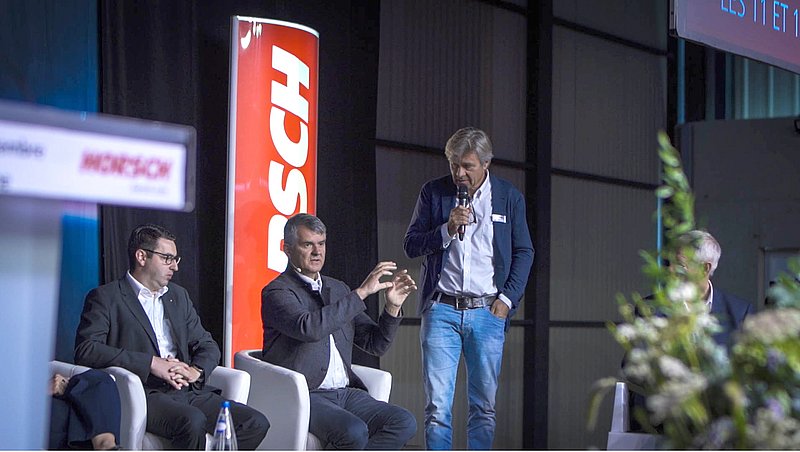
“These examples of consensus and discussion reflect what we want to achieve with our concept of hybrid farming: a combination of the best from two – actually different – worlds (organic and conventional farming)“, Michael Horsch explains. The farmer and the agricultural sector, thus, can be the driving force in fighting the climate warming. And they can earn money by doing so. An example: If Germany increases the humus content on its twelve hectares of arable land by 0.1 percent, 100 million tons of carbon could be retained. On the carbon market, one ton of CO2 costs about 50 Euro…
Michael Horsch finished his speech like he started it: “The future of farming has never before been as interesting as it is today!“
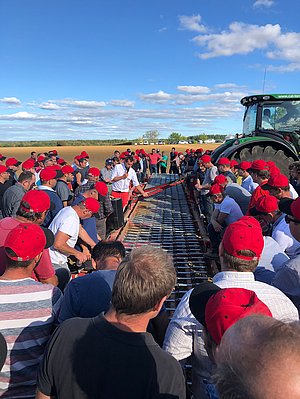
A question of balance…
The next speaker was Nicolas Kerfant, the managing director of the Agro branch of BASF France. When he was asked about his point of view with regard to the future of agriculture, he preferred to keep his distance. In our society, everything is a question of balance. “If you change something on the scales, it does not necessarily have an immediate consequence. But once society starts to move, it will be too late to reverse the trend.” And he adds: “I would rather prefer to be in your place than in mine. Despite my position, despite the nice company I am working for, I, unlike you, do not cover such a basic demand of society.” And eating is one the most vital needs.
Nicolas Kerfant then shortly presented BASF. The company operates in many different sectors and works on an international level. 900 million Euro are invested every year in solutions for agriculture.
A war of opinions that is already lost?
„We can show the results, e.g. application solutions, we found, but we had to notice: We, too, are faced with agri-bashing. We are losing the battle of opinion, if it has not already been lost”, Nicolas Kerfant explains. “With regard to the plant protection agents, the main target of the attacks, no effort we took during the past 60 years was enough.” Just take the mere decrease in quantity by 60 per cent or the reduction of the hazardous nature of the products by one thirteenth as an example. “Even my mother-in-law has become a plant protection expert within six months. Therefore, we try to take an educational approach to explain the difference between hazardous nature and risk, but the misinformation on the internet is too strong for us…”
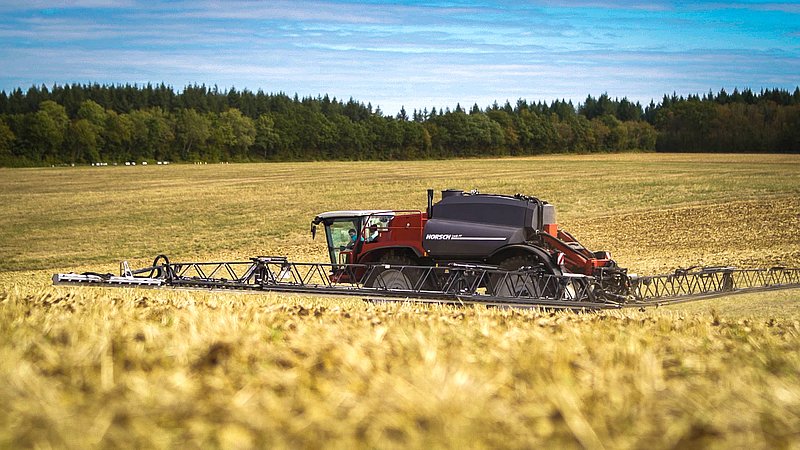
According to Nicolas Kerfant the scientists have to put an end to this and point out the right track. For example, the decision to introduce in France not-treated field sections ranging from five to ten metre, was, in his opinion, not based on a real scientific assessment, but a merely political one. “There is lobbying on each side, everyone defends his position…“
“We have to talk about what we can do and about our innovations. We regularly have new solutions, for example biological agents on a pheromone basis”, Nicolas Kerfant emphasises. But despite these innovations, the plant protection market will be facing a decline by 25 to 50 per cent until 2030.
Nicolas Kerfant is sure: „In some years there will be at least three different types of agriculture: conventional farming that will allow for feeding the world at low costs. Organic farming with cachets that meets the requirements of a small, but not negligible part of the population. And a farming system that is somewhere in between – a name has not yet been created for this system – that is based on the HVE principle (Haute Valeur Environnementale = Of high environmental benefit).“ Why should we not call it hybrid farming? Each of these three systems is, by all means, already obsolete as they develop constantly. So you have to keep pace with the development.
Among the other new solutions Nicolas Kerfant particularly points out hybrid wheat. Enormous sums are spent on it and the results will only be available in three to four years. This wheat will allow for increasing yields and it will be considerably more resistant to illnesses. Digitisation, too, brings about a lot of solutions with regard to the optimisation of application and metering. “We are rather afraid of the machine manufacturers as their solutions become more and more efficient”, Nicolas Kerfant says with a sideways glance at Michael Horsch. “For us it means a loss of earnings, but the direction is the right one.“
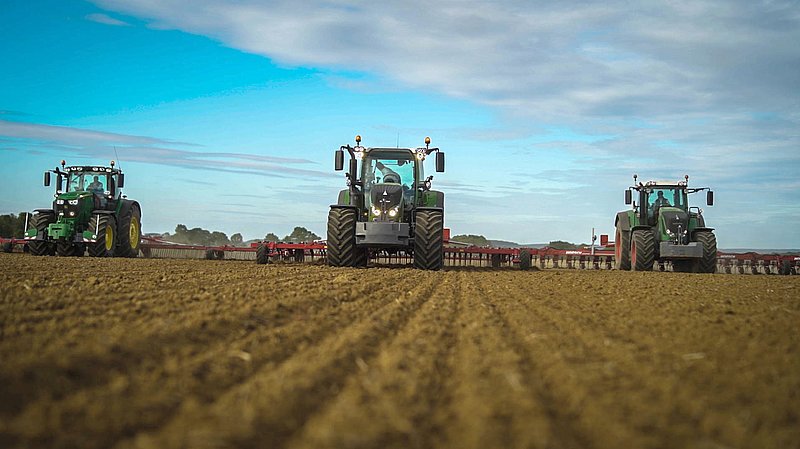
During the following discussion a farmer asked point-blank if BASF had chemical solutions that might replace glyphosate. Nicolas Kerfant’s answer was emphatically: “Yes! We do have such products – more expensive, less effective and more harmful for the environment…” Food for thought…
The right soil fertility management for organic farming
The arable land of Josef Hägler’s farm amounts to 110 ha. The farm is located at a height of 540 m above sea level. The average annual rainfall is about 600 mm. The potential of his rather light soils on sandy silt is rather low. Moreover, he raises beef cattle.
Some years ago, Josef Hägler and his farm took part in a five-year-test regarding the effect of liquid manure on the activity of the soil. Soil sciences have been his passion ever since.
In his opinion, the main focus has to be on the correct metering of the fertiliser. Using too much fertiliser is as problematic as using too little. The risk to turn the balance of the other components upside down by over fertilisation with one component is really high. This is the reason why Josef Hägler for more than ten years has been relying on the Kinsey method. The Kinsey soil analyses are based on a method that mainly depends on the knowledge of the balance between the mineral nutrients of the soil and that suggests corrective measures if there are any problems.
Moreover, Josef Hägler does not incorporate liquid manure that is not yet decomposed. He uses a special method to make sure that the liquid manure is transformed via fermentation and decomposed properly. The manure is put into a manure spreader to obtain a homogeneous mixture and an optimum oxygen content and to avoid nitrogen losses. The heap then is compacted with a dredger bucket from the outside. Thus, the CO2 can no longer escape. The whole process is monitored with a thermometer. The temperature must not exceed 55° C to prevent the fertiliser elements from being burnt. The silo must not be covered as the light has an effect on the water retention. In summer the heap growths within eight weeks and a lot of humus-enhancing elements are generated.
For him it is a matter of honour to never incorporate residues that are still green. This little mistake would automatically entail pollution problems that could hardly be fought without a plough as earthworms do not eat green plants and the rotting process would damage the humus.
Due to his decision to work without a plough, Hägler is able to maintain the bacterial life of his soils. Not turning the soil means that anaerobic bacteria remain deep down in the soil and aerobic bacteria stay on the surface. If organic substratum is added, mineralisation does not only proceed very well, but also very fast!
The cultivation concept contributes to a considerable increase of the humus ratio in the soil. As the adsorptive capacity of humus is thrice as high as the adsorptive capacity of silt, the soil is better able to store elements like nitrate, sulphur and boron. The difference is enormous: for soils with tight structures and a humus ratio of respectively 3.3 and 5.6 per cent the yield difference amounts to 0.20 t per ha! In the first case, 650 m3 water are retained compared to 1630 m3 in the second case!
Fertilisation can be carried out in two different ways. The previously prepared compost can be spread directly before sowing. Another option is to turn the compost into pellets and to spread them while sowing.
The soil is cultivated at a depth of 3 cm, the residues are kept and left on the spot. The soil can be cultivated at a maximum depth of 4 cm. The first pass with the roller closes the soil hermetically and produces fine earth. Humidity is kept in the soil.
As a seed drill Josef Hägler uses a modified HORSCH Pronto DC. The discs have been replaced by duck foot coulters. Thus, even the last crop growth is cut off before the seed. The traditional harrow of the Pronto was modified, too. The soil can be closed in a better way and the roots can be taken to the surface. The soil is rolled once more to avoid nitrogen losses and to stimulate weeds.